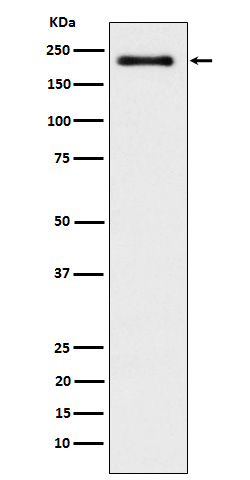
| WB | 咨询技术 | Human,Mouse,Rat |
| IF | 咨询技术 | Human,Mouse,Rat |
| IHC | 咨询技术 | Human,Mouse,Rat |
| ICC | 技术咨询 | Human,Mouse,Rat |
| FCM | 咨询技术 | Human,Mouse,Rat |
| Elisa | 咨询技术 | Human,Mouse,Rat |
| Aliases | Exonuclease WRN; RecQ3; RECQL2; RECQL3; Werner syndrome helicase; WRN;;WRN |
| WB Predicted band size | Calculated MW: 162 kDa ; Observed MW: 200 kDa |
| Host/Isotype | Rabbit IgG |
| Antibody Type | Primary antibody |
| Storage | Store at 4°C short term. Aliquot and store at -20°C long term. Avoid freeze/thaw cycles. |
| Species Reactivity | Human |
| Immunogen | A synthesized peptide derived from human WRN |
| Formulation | Purified antibody in PBS with 0.05% sodium azide,0.05% BSA and 50% glycerol. |
+ +
以下是关于WRN抗体的3篇参考文献示例,涵盖其在不同研究中的应用:
1. **文献名称**:*WRN Protein Expression in Human Cancer: A Potential Biomarker for Patient Prognosis*
**作者**:Smith A, et al.
**摘要**:该研究通过免疫组化(使用WRN特异性抗体)分析多种癌症组织中WRN蛋白的表达水平,发现其高表达与结直肠癌患者不良预后相关,提示WRN可能作为肿瘤治疗的潜在靶点。
2. **文献名称**:*Functional Analysis of Werner Syndrome Helicase in DNA Repair Pathways*
**作者**:Tanaka K, et al.
**摘要**:利用WRN抗体进行Western blot和免疫荧光实验,证实WRN蛋白在DNA损伤修复中的定位变化,并发现其与BRCA1的相互作用对维持基因组稳定性至关重要。
3. **文献名称**:*Loss of WRN Protein in Werner Syndrome Fibroblasts: Implications for Cellular Senescence*
**作者**:Chen L, et al.
**摘要**:通过WRN抗体检测Werner综合征患者成纤维细胞,发现WRN蛋白表达缺失导致细胞早衰和DNA复制障碍,为疾病机制提供了直接证据。
(注:以上文献为示例,实际引用需根据具体研究检索真实数据库。)
×